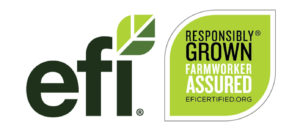
Aug 20, 2020
From fields to processing facility, Misionero listens to labor
Not all labor and management relationships run smoothly, but agricultural employers sleep better where there’s teamwork.
Organic greens company Misionero recently finished a lengthy effort to ensure employees at its Gonzales, California processing plant were safe, happy and felt like part of the team.
Two years of bilingual skill training, leadership training and third-party audits resulted in Misionero receiving certification from Equitable Food Initiative (EFI) – the same non-profit group that is certifying many growers in the region, including Misionero’s suppliers.
Misionero, founded in 1973 by Floyd Griffin, grows, harvests, produces and packages high-quality vegetables that are grown year-round, specializing in organic leafy greens. It also produces products sold under the Earth Greens Organic, Garden Life, and Green Wave Farms labels.
From picking to processing
 “EFI’s roots are in certifying farming operations. That was the main focus when it got started, said Nicole Zapata, marketing director at Misionero. “We thought there was an opportunity to bring that same type of certification into the processing facilities. Stemming from the same fundamental foundation and developed in a manner to fit processing facilities.”
“EFI’s roots are in certifying farming operations. That was the main focus when it got started, said Nicole Zapata, marketing director at Misionero. “We thought there was an opportunity to bring that same type of certification into the processing facilities. Stemming from the same fundamental foundation and developed in a manner to fit processing facilities.”
EFI, which traces its roots back to some 2008 meetings led by Costco Wholesale, United Farm Workers and Oxfam America, launched as an independent nonprofit group in 2015. The group “seeks to increase transparency in the food supply chain and improve the lives of farmworkers through a team-based approach to training and continuous improvement practices,” according to its website.
Misionero’s Gonzales plant is the first processing-only facility to be certified in the U.S. and the first EFI-certified operation located in the Salinas Valley. Misionero’s Yuma, Arizona facility is also in the process of certification. Misionero is currently partnering with its growing partners to bring the first EFI-labeled leafy greens into the marketplace.
While some organic growers dislike certification programs and produce labels that add on to the National Organic Program, Zapata said Misionero saw value in EFI.
“EFI provides a social accountability model rather than sustainability,” she said. “It helped us build on our strong, existing company culture to ensure the employees have the right channels and access points to be part of the conversation – to help us improve the business from their perspective.”
She added that sustainability and social accountability have been important pillars of growth for the company. “We are tuned in, we know what we want to accomplish as a business and company culture and know that our customers want the same. EFI certification verifies the good work that we were doing, strengthened the way we engage with our team at all levels and set a high standard of transparency within our organization.”
Setting standards
Pete Donlon, vice president at Misionero, participated in initial 2008 meetings and has been involved with EFI since its inception in 2015 and serves on the EFI standards committee. EFI certification holds the most rigorous standards in the industry for labor practices, food safety and pest management, according to Misionero. “We could not be more proud of what has been accomplished,” Donlon said in a released statement.
Getting the certification meant training from EFI and the formation of a worker-manager collaborative team.
“There have been three-day trainings since the EFI certification was initiated at the Gonzales and Yuma facilities,” Zapata said. “Our EFI team also holds weekly meetings to cover all topics that ensure continued compliance with the EFI standards.”
“In the initial training, lists of various topics would be posted for discussion stemming anywhere from safety at the plant (to) sexual harassment, ‘What is Misionero good at, where can we help? And how do we do it?’ Sessions would last for eight hours a day, three days in a row discussing all topics that applied.”
Communication and participation
All sessions were conducted in English and Spanish, and Zapata said everyone was on board with the program from the building. But it still took a while for the staff to warm up to the idea of speaking up in groups.
“I think you know how it is – in the produce industry, we move so fast, we wanted to get it all out in six months,” she said. “But everyone worked with us along the way. Once they knew that we wanted them to speak up and tell us what they needed as a team, the hat was out of the box and it was great.”
The result of those conversations was an atmosphere of teamwork.
“Just bringing our team together, and that was the biggest outcome that entered knowing that everybody would be speaking up and we were able to establish our company the way our employees wanted to,” Zapata said.
Employees also better understand how to report issues that arise. A twelve-person group, called the EFI Leadership Team, is made up of individuals pulled from all segments of Misionero’s business. The group acts as a funnel for workplace problems before they are brought to the human resources office or upper management. The leadership team stays visible among the staff by wearing EFI badges and having their pictures posted on signs.
“People know who to go to directly with questions or if they run into problems,” Zapata said. “They can talk to each other, go to one layer of management, and don’t have to go right to the top.”
Addressing audits
EFI is also going to be able to ease some of the audit fatigue felt by Misionero and the industry as whole by incorporating food safety audits into the certification.
“We have been working with EFI since the founding, so we have been able to collaborate and pilot new aspects of the initiative as it grows,” Zapata said.
The result is increased transparency in the food chain, and perhaps even a competitive advantage in the industry.
“Misionero has proven its leadership and dedication to its organization and industry by becoming the first EFI certified operation in the California Salinas Valley – the salad bowl of the world,” said Kenton Harmer, managing director for EFI.
Misionero is proud of the results of its investment, and other growers are taking notice.
“We are proud of what we have accomplished with EFI and look forward to others joining us in the near future,” Zapata said.
Above, the EFI leadership team at Misionero’s Salias processing facility. Photo: Misionero









